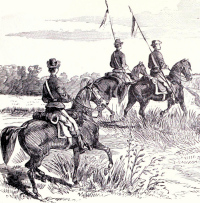THE SITUATION.
Springfield, November 1st. It is certain that Price left Neosho on Monday and is moving towards us. He probably heard how small the force was with which the General arrived here, and thinks that he can overwhelm us before the other divisions come up. We have had some fear of this ourselves, and all the dispositions have been made for a stubborn defence in case we are attacked. The last two nights we have slept on our arms, with our horses saddled and baggage packed. Now all danger is past: a part of Pope’s division came in this morning, and McKinstry is close at hand. He has marched nearly seventy miles in three days. The evidence that Price is advancing is conclusive. Our scouts have reported that he was moving, and numerous deserters have confirmed these reports; but we have other evidence of the most undoubted reliability. During the last two days, hundreds of men, women, and children have come into our lines, –Union people who fled at the approach of the Rebels. I have talked with a number of these fugitives who reside southwest from here, and they all represent the roads to be filled with vast numbers of men and teams going towards Wilson’s Creek. They give the most exaggerated estimates of the number of the enemy, placing them at from fifty thousand to one hundred and twenty-five thousand men; but the scouts and deserters say that the whole force does not exceed thirty-two thousand, and of these a large number are poorly armed and quite undisciplined. Hunter has not come up, nor has he been heard from directly, but there is a report that yesterday he had not left the Osage: if this be true, he will not be here in time for the battle.
The Rebel generals must now make their choice between permitting themselves to be cut off from their base of operations and sources of supply and reinforcement, and attempting to reach Forsyth, in which case they will have to give us battle. The movement from Neosho leaves no doubt that they intend to fight. It is said by the deserters that Price would be willing to avoid an engagement, but he is forced to offer battle by the necessities of his position, the discontent of his followers, the approaching expiration of their term of enlistment, and the importunities of McCulloch, who declares he will not make another retreat.
We are now perfectly prepared. Hunter’s delay leaves us with only twenty-two thousand men, seventy pieces of artillery, and about four thousand cavalry. In view of our superiority as respects armament, discipline, and ordnance, we are more than a match for our opponent. We sleep to-night in constant expectation of an attack: two guns will be fired as a signal that the enemy are at hand.
Fremont’s Hundred Days in Missouri was published in three installments in The Atlantic Monthly. The anonymous author appears to have been a member of Fremont’s staff with a disdainful bias towards Missourians, even those who were pro-Union.
